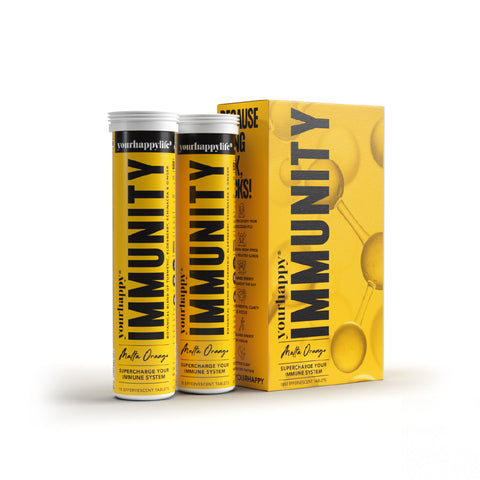
Don’t Eat. Sleep. Repeat. Stop, and Boost Your Immunity Right Now.
Immunity is the buzzword everywhere. But are our defensive mechanisms working well? COVID-19 has left everyone confused because of the different symptoms it poses. While there is a lot of conversation about hygiene protocols, shouldn’t we be working and making our bodies strong, so we can fight this deadly disease? Yes, working from home has made us feel like couch potatoes, but it’s time we move along, stay active, and eat right. It’s not time to eat. sleep. repeat. It’s time to make a change.
Here’s what our in-house experts are suggesting on how to boost your immunity:
Improve Your Diet
“You are what you eat”. I am sure you are familiar with this quote and raise your hand if you are guilty of not always eating the right way. While all of us are losing our patience when we are stuck at home, this is not the time to react to our frustration, but to find a solution on how to boost our immunity.
First up, start with a low-carb diet and make sure you add enough protein to your meal - no, this doesn’t only mean weight loss. It will also help you control high blood sugar and pressure. Focus on a protein-rich diet so that your body is functioning at an optimum level.
Also Read: 6 Collagen Rich Foods in India
When it is green, it is healthy. So, eating green veggies right now is key. Make sure you include vegetables like mushrooms, tomatoes, bell pepper, and green veggies like broccoli, spinach, and more. These green superheroes will build resilience in the body against infections. Regularly eating nitrate-rich leafy greens, like spinach and kale, can boost muscle function, and will help prevent falls and fractures. The body converts nitrates into nitric oxide, which can open up the blood vessels, improving blood flow and exercise performance. Over time, a vegetable-rich diet can improve heart health and cognitive health. So - eating greens right now will keep the doctor at bay.
Apart from the obvious of eating green, we forget about the herbs that boost immunity in our body such as garlic, basil leaves, and black cumin. Certain seeds and nuts like sunflower seeds, flax seeds, pumpkin seeds, and melon seeds are excellent sources of protein and vitamin E. Don’t fret about recipes - there are many available on the internet.
Probiotics (like Yoghurt, and fermented food) is a recent term that everyone is hearing about. But no - it isn’t a fad. It is very necessary to improve gut bacteria. Probiotics work well and help you when you lose “good” bacteria in your body, for example after you take antibiotics, probiotics can help replace them. Probiotics can also balance your “good” and “bad” bacteria to keep your body working the way it should.
Also Read: What is Probiotic? Why Should it be a Part of our Daily Regiment?
Include turmeric in your diet because it is known for its anti-oxidant and anti-inflammatory properties. Curcumin, the compound present in turmeric, is a very potent agent and aids in healing wounds and infections. Its uses have been described as anti-inflammatory, anticancer, and antioxidant, as well as antiviral. Curcumin has the potential to heal pulmonary edema and other injurious processes that lead to lung fibrosis following COVID-19. It also inhibits viral enzymes and host cell receptors.
Among all kinds of Vitamins, Vitamin C and Vitamin D play a major role in strengthening one's immunity. We usually depend on Vitamin C from our vegetables and fruits. Red peppers, oranges, strawberries, broccoli, mangoes, lemons. The potential role of vitamin C in preventing and ameliorating infection. Various case studies reported that low vitamin C levels are typical in critically- ill hospitalized patients, with both respiratory infections, pneumonia, sepsis, and COVID-19 - the most likely explanation being increased metabolic consumption. Vitamin C has an important homeostatic role as an antioxidant. It is known to demonstrate direct virucidal activity and augment interferon production. It has effector mechanisms in both the innate and adaptive immune systems.
Zinc is an essential element for the human body responsible for the catalytic activity of more than 100 enzymes, adequate functioning of the immune system, synthesis of genetic materials, and maintaining cell integration. Oysters are the best-known sources of zinc. Other food sources include seafood like crab, and lobster, animal sources like red meat, and poultry, and plant sources such as beans, nuts, whole grains, and fortified breakfast cereals.
Sleep Well
It is important to clock in at least 7-8 hours of sleep because it plays an important role in the strength of the immune system. When you are sleeping, your body releases proteins called cytokines, some of which promote sleep. When you have an infection or any inflammation, cytokines need to increase.
In addition, infection-fighting antibodies and cells are reduced during periods when you don't get enough sleep. So, your body needs sleep to fight infectious diseases. Long-term lack of sleep also increases your risk of obesity, diabetes, and heart and blood vessel (cardiovascular) disease.
Lesser sleep will leave you tired and impair your brain activity. Remember that it adversely affects the action of the flu vaccine. So, I guess it is time we say goodbye to late-night binge-watching on your television.
Stay Hydrated
This is the most underrated advice. Drink up to 8-10 glasses of water every day because this will help flush out the toxins from the body and lower the chances of flu or any other diseases. You could also include other alternatives like juices made of citrus fruits and coconut water, to beat the heat.
Also Read: The Best and Worst Times of Day to Hydrate
Exercise
It is important to have a regular exercise routine followed by a good diet. It will go a long way in releasing the toxins from your body. It also improves metabolism, which has a direct correlation with body immunity. Regular exercising will help flush bacteria out of the lungs and airways. This may reduce your chance of getting a cold, flu, or other illness. Exercise causes changes in antibodies and white blood cells (WBC). WBCs are the body's immune system cells that fight disease. These antibodies or WBCs circulate more rapidly, so they could detect illnesses earlier than they might have before. Exercise slows down the release of stress hormones. Some stress increases the chance of illness. Lower stress hormones may protect against illness. So it’s time you make a change in your lifestyle.
Also Read: Best Tricks to Increase White Blood Cells
De-Stress Yourself
We live in anxious times, and a prolonged period of staying indoors has its setbacks on your mental well-being. While the uncertainty might be overwhelming, meditation, exercising, and Yoga can regularly help relieve you of your stress which results in lower immunity. Practicing meditation will help you regularize your cortisol levels. So don’t let them go up, because that makes you prone to infections.
Avoid Your Vices
Avoid smoking, alcohol, and other addictive substances because they weaken your body's defenses and increase the chances of respiratory illnesses. Drinking and smoking also impair immune cells in key organs. When someone is exposed to a virus, the body mounts an immune response to attack and kill the foreign pathogen. In general, the healthier a person’s immune system is, the quicker it can clear out a virus and recover from a disease like COVID-19. By default, alcohol makes it harder for the immune system to gear up and defend the body against harmful germs. In the lungs, for example, alcohol damages the immune cells and fine hairs that have the important job of clearing pathogens out of our airways. Similarly, alcohol can trigger inflammation in the gut and destroy microorganisms. When the body is unable to clear a pathogen, an infection can worsen and lead to more severe, life-threatening complications.
Smoking affects the respiratory system and also the circulatory system. With smoking, there is raised blood pressure, and tightening of blood vessels in the skin, resulting in a drop in skin temperature. Also, there is less oxygen carried by the blood during exercise. Also, you must remember with smoking your blood gets ‘stickier’ which is prone to clotting. It also damages the lining of the arteries, and there is an increased risk of stroke due to the blockages of the blood supply. The effects of tobacco smoke on the immune system include greater susceptibility to infections, more severe and long-lasting illnesses, and lower levels of protective antioxidants (such as vitamin C) in the blood.
It is best to be in control of your vices in such anxious times.
Also Read: Why is it Necessary to Consume Antioxidant Rich Foods
Introduce Supplements to Your Life
While all the above-mentioned tips will help, the need of the hour is any immunity-boosting vitamins which is right for your body. To get the right amount of nutrients in your diet - consult a doctor and add supplements to your diet such as Vitamin C, Vitamin D, Zinc, Omega-3, and more. 
Make sure you are consistent with your supplements, and YourHappy Immunity is something you would want to introduce to your routine. It will supercharge your immune system. With a complete formulation of clinically proven ingredients designed to strengthen & protect your body’s defenses against viruses, bacteria, and stress-related illnesses. It is your go-to solution for a strong immune system.
And Other Tips
Start your day by drinking warm water throughout the day, bookmark a few breathing exercises for stronger lungs and to reduce stress levels. Drink herbal tea or a decoction of Holy Basil, Cinnamon, Black pepper, Dry Ginger, and Raisin. This may upset you, but avoid sugar (you may replace it with jaggery if needed). Apply Ghee (clarified butter), Sesame oil, or Coconut oil in both nostrils to keep the nostrils clean. Make sure you are regular with your steam inhalation. Adding mint leaves helps. This is a lot to remember - so make a note of it!
It’s time to boost your immunity and not be sluggish at home.
Conclusion
We have to be responsible for our immunity while our body is fighting against the virus. We can do our bit stay fit and follow protocols in such trying times.
Sources:


